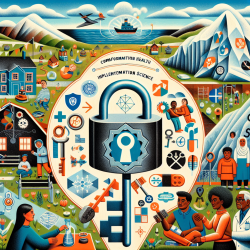Introduction
The COVID-19 pandemic has reshaped many aspects of life, especially for women who have faced unique challenges in balancing work, home, and personal wellbeing. A recent study titled "The COVID-19 pandemic’s intersectional impact on work life, home life and wellbeing: an exploratory mixed-methods analysis of Georgia women’s experiences during the pandemic" provides valuable insights into these challenges. As practitioners, understanding these impacts can enhance our skills and improve the support we offer to clients, particularly in the realm of online therapy services.
Understanding the Research
The study conducted in Georgia utilized a mixed-methods approach to explore the adverse experiences of women during the pandemic. It identified four distinct subgroups based on their exposure to various adversities:
- Low Exposure: Women with minimal adverse experiences, often older and non-Hispanic white.
- High Exposure: Women facing multiple adversities, including financial insecurity and health challenges, often from minority groups.
- Caregiving Stress: Women struggling with balancing work and caregiving duties, experiencing increased stress and conflict.
- Mental Health Changes: Women experiencing significant mental health challenges, despite low exposure to other adversities.
Implications for Practitioners
For practitioners, these findings highlight the importance of adopting an intersectional approach when supporting clients. Understanding the diverse experiences and challenges faced by different subgroups can inform more tailored and effective interventions. Here are some strategies to consider:
- Enhance Cultural Competency: Recognize and respect the diverse backgrounds and experiences of clients. Tailor interventions to meet the unique needs of minority populations who may face compounded adversities.
- Focus on Mental Health: Given the high prevalence of mental health issues reported, integrate mental health support into your practice. Encourage open discussions about mental health and provide resources for clients to access additional support if needed.
- Support Caregivers: Offer strategies to help clients manage caregiving responsibilities alongside work commitments. This might include time management techniques, stress reduction strategies, and connecting clients with support networks.
- Promote Resilience and Adaptation: Highlight stories of resilience and adaptation from the study to inspire and empower clients. Encourage them to identify their strengths and build on them to navigate challenges.
Encouraging Further Research
While this study provides a foundational understanding of the pandemic's impact on women in Georgia, further research is needed to explore these issues in different contexts and populations. Practitioners are encouraged to stay informed about emerging research and consider contributing to studies that explore the intersectional impacts of the pandemic.
Conclusion
By integrating the insights from this research into practice, practitioners can enhance their skills and provide more effective support to clients. The pandemic has underscored the importance of understanding the complex interplay of factors affecting wellbeing, and as practitioners, we have a role to play in addressing these challenges.
To read the original research paper, please follow this link: The COVID-19 pandemic’s intersectional impact on work life, home life and wellbeing: an exploratory mixed-methods analysis of Georgia women’s experiences during the pandemic.










